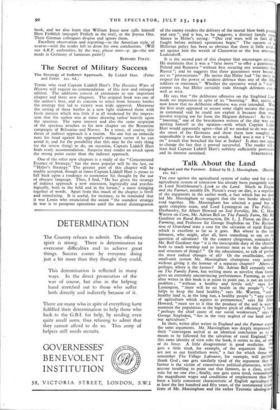The Secret of Military Success
THOSE who read Captain Liddell Hart's The Decisive Wars of History will require no commendation of this new and enlarged edition. The additions consist of extensions to one important chapter and three new chapters. The original book was one of the author's best, and its concern to select from historic battles the strategy that led to victory won wide approval. Moreover the setting of these battles in a new light endowed them with fresh interest which was little if at all weakened by the impres- sion that the author was at times drawing rather heavily upon the specious. The same interest and also the same suspicion of the specious attaches to his new chapter on the Byzantine campaigns of Belisarius and Narses. In a sense, of course, this thesis of indirect approach is a truism. No one but an imbecile runs his head against his opponent's strongest sector if he can avoid it; and for the possibility that this may be the only thing (or the wisest thing) to do, on occasion, Captain Liddell Hart finds ready accommodation. Surprise may render an attack upon the strong point easier than the indirect approach.
One of the other new chapters is a study of the "Concentrated Essence of Strategy," but the most popular will be the last, on "Hitler's Strategy." The greater part of this chapter will be readily accepted, though at times Captain Liddell Hart is prone to fall back upon a tendency to economise his thought by the use of obscure language. Thus, I find, "He has given the strategy of indirect approach a new extension, logistically and psycho- logically, both in the field and in the forum," a mere stringing together of words. Apart from this much of the chapter is fresh and stimulating. It is useful, for instance, to be reminded that it was Lenin who enunciated the axiom "the soundest strategy in war is to postpone operations until the moral disintegration
of the enemy renders the delivery of the mortal blow both posst and easy "; and it has, as he suggests, a distinct family r blance to Hitler's saying : "Our real wars will in fact all fought before military operations begin." The success of Hitlerian policy has been so obvious that there is little need set against him the wraith of Clausewitz or the less attenuat Ludendorff.
It is the second part of this chapter that encourages criticisrt He maintains that it was a "false move" to offer a guarantee Poland and Rumania "without first securing any assurance hurl Russia "; and he suggests that these guarantees were bound to act as "provocations." He insists that Hitler had "far more re: respect for the power of modern defence than any of the Alli soldiers or statesmen." Whether the operative word is "real cannot say, but Hitler certainly rode through defences east a well as west.
He says that "the deliberate offensive on the Siegfried Line made no impression in spite of its "boosting." But, surely, now know that no deliberate offensive was ever intended. Wh the first steps appeared to secure some slight success the goner, in command said he could not exploit it because that won, involve straying too far from the Maginot defences! As for th, "boosting," one of the best-known writers of the day was cot1. mitting himself to the opinion—with which Captain Lidde Hart would apparently agree—that all we needed to do was chea the onset of the Germans and show them how naughty az, unprofitable it was for them to attack. And was it not a " head- on " assault that breached the line at Sedan? It does not appec to change the fact that it proved successful. The reader will least find Captain Liddell Hart's subtlety sufficiently provocan


























 Previous page
Previous page